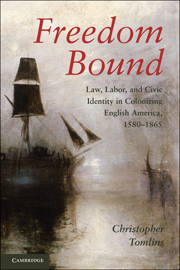Book contents
- Frontmatter
- Contents
- Tables and Figures
- Acknowledgments
- Freedom Bound
- Prologue Beginning
- Part I Manning, Planting, Keeping
- 1 Manning
- 2 Planting
- 3 Keeping (i)
- 4 Keeping (ii)
- Part II Poly-Olbion; or The Inside Narrative
- Part III “What, then, is the American, this new man?”
- Appendices to Chapter 1
- Index
- References
1 - Manning
“Setteynge many on Worke”
Published online by Cambridge University Press: 05 June 2012
- Frontmatter
- Contents
- Tables and Figures
- Acknowledgments
- Freedom Bound
- Prologue Beginning
- Part I Manning, Planting, Keeping
- 1 Manning
- 2 Planting
- 3 Keeping (i)
- 4 Keeping (ii)
- Part II Poly-Olbion; or The Inside Narrative
- Part III “What, then, is the American, this new man?”
- Appendices to Chapter 1
- Index
- References
Summary
This enterprice will mynister matter for all sortes and states of men to worke upon: namely all severall kinds of artificers, husbandmen, seamen, marchauntes, souldiers, capitaines, phisitions, lawyers, devines, Cosmographers, hidrographers, Astronomers, historiographers, yea olde folkes, lame persons, women, and younge children by many meanes wch hereby shall still be mynistred unto them, shalbe kepte from idlenes, and be made able by their own honest and easie labour to finde themselves wthoute surchardginge others.
Richard Hakluyt (the younger), “Discourse of Western Planting” (1584)Immense resources were mobilized in the service of English ambition to take possession of the North American mainland. None was more important than people. Richard Hakluyt the elder – lawyer of the Middle Temple, Member of Parliament, confidant of statesmen, and propagandist for colonizing – said it first and best. To “keepe” the country, it had to be “planted” – occupied and rendered productive. But planting required people. It was an imperative, hence, that the country be “man[ned].”
The elder Hakluyt gave the existing inhabitants but a sidelong glance. The ultimate objective being lasting territorial possession rather than mere gain through a bilateral commerce, he held the indigenous population largely irrelevant to the colonizer’s purposes – “of small consideration” other than as an obstacle to be negotiated. Manning meant migration, the introduction of alien populations into North America as new inhabitants clearly within the colonizer’s jurisdiction, to be marshaled to serve the colonizer’s ends: first, as a manageable labor force to produce commodities for European buyers; second, and more generally, as a physical presence, human facts on the ground to establish occupancy. Approximately 800,000 people (60 percent European, 40 percent African) crossed the Atlantic during the two centuries that followed the first intrusions of the 1580s – nearly 200,000 during the seventeenth century, more than 600,000 during the eighteenth. Manning made the colonizer’s claim to dominion materially manifest.
- Type
- Chapter
- Information
- Freedom BoundLaw, Labor, and Civic Identity in Colonizing English America, 1580–1865, pp. 21 - 66Publisher: Cambridge University PressPrint publication year: 2010



